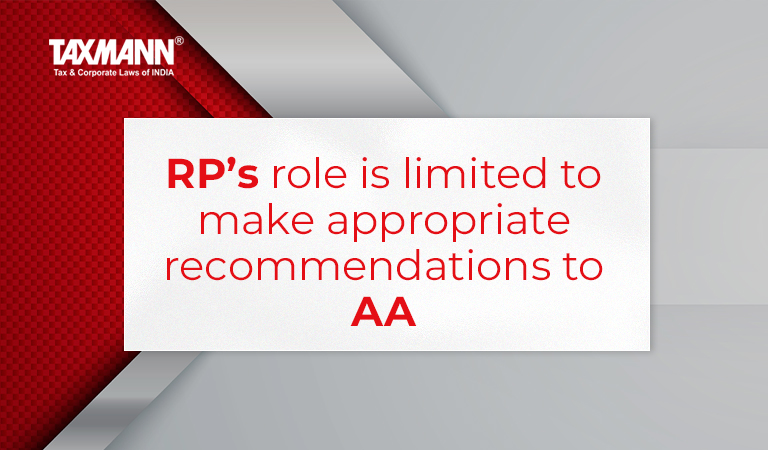RP’s role is limited to make appropriate recommendations to AA
- News|Blog|Insolvency and Bankruptcy Code|
- 3 Min Read
- By Taxmann
- |
- Last Updated on 26 May, 2022

Case Details: Babu A. Dhammanagi v. Union of India - [2022] 138 taxmann.com 406 (HC-Karnataka)
Judiciary and Counsel Details
-
- Alok Aradhe & S. Vishwajith Shetty, JJ.
- Shashank Kumar, Adv. for the Petitioner.
- M.N. Kumar, CGC, Angad Verma, George Joseph, Ms/Mrs. Malarika Prasad & A.S. Vishwajith, Advs. for the Respondent.
Facts of the Case
In the instant case, a writ petition was filed by the petitioner before High Court questioning the constitutional validity of sections 95(1), 99 and 100 of the Insolvency and Bankruptcy Code, 2016 (IBC) being violative of Article 14 of the Constitution of India.
An inter-corporate deposit agreement was executed between the Corporate Debtor and the Perimal Enterprise (respondent). The respondent filed two separate applications u/s 95(1) of the IBC read with rule 7(2) of the IBC (Application to Adjudicating Authority for Bankruptcy Process for Personal Guarantors to Corporate Debtors) Rules, 2019 with a prayer to initiate Corporate Insolvency Resolution Process (CIRP).
The National Company Law Tribunal (NCLT) passed an interim moratorium order against the petitioners and also appointed a resolution professional (RP) u/s 97 of the IBC. Thereafter, a virtual meeting of the resolution professional and the petitioner’s counsel was held. The resolution professional submitted its report to the NCLT u/s 99(1) of the IBC recommending the acceptance of the application filed by the respondent.
The Learned counsel for the petitioner submitted that the impugned provisions were in violation of the principles of natural justice as no opportunity of being heard is envisaged in the proceedings. He also submitted that the resolution professional was appointed by the creditor and no person can be a judge on his own case.
High Court Held
The High Court held that insolvency proceedings initiated against personal guarantor under Code was a time-bound process and aforesaid procedure contains filing of an application under section 95 for appointment of Resolution Professional by Adjudicating Authority under section 99, submission of report by Resolution Professional under section 99, recording reasons for recommending a request for acceptance or rejection of an application and finally admission or rejection of an application by the Adjudicating Authority.
The Court further observed that as per the procedure prescribed under sections 95 to 100, the role of the Resolution Professional was limited to making appropriate recommendations to Adjudicating Authority and the final decision of admission or rejection of an application referred to under section 95 solely lies with the Adjudicating Authority.
In view of the above, the High Court ruled that the Adjudicating Authority is not bound by the recommendation made by Resolution Professional. There was no element of adjudication on part of the Resolution Professional. Therefore, the contention raised by the petitioner that the impugned provisions are arbitrary as no person can be allowed to be a judge in his own case was misconceived.
Therefore, the procedure prescribed under the provisions contained in sections 95 to 100 is fair, rational and reasonable and the same cannot be termed to be violative of Article 14. For the aforementioned reasons, the challenge made to the validity of the provisions as contained in sections 95 to 100 of the Code was repelled. Accordingly, the writ was dismissed.
List of Cases Referred to
-
- Uma Nath Pandey v. State of U.P. AIR 2009 SC 2375 (para 3)
- Justice P.D. Dinakaran v. Judges Inquiry Committee AIR 2011 SC 3711 (para 3)
- Gujarat Urja Vikas Nigam Ltd. v. Amit Gupta [2021] 125 taxmann.com 150/167 SCL 241 (SC) (para 4).
Disclaimer: The content/information published on the website is only for general information of the user and shall not be construed as legal advice. While the Taxmann has exercised reasonable efforts to ensure the veracity of information/content published, Taxmann shall be under no liability in any manner whatsoever for incorrect information, if any.

Taxmann Publications has a dedicated in-house Research & Editorial Team. This team consists of a team of Chartered Accountants, Company Secretaries, and Lawyers. This team works under the guidance and supervision of editor-in-chief Mr Rakesh Bhargava.
The Research and Editorial Team is responsible for developing reliable and accurate content for the readers. The team follows the six-sigma approach to achieve the benchmark of zero error in its publications and research platforms. The team ensures that the following publication guidelines are thoroughly followed while developing the content:
- The statutory material is obtained only from the authorized and reliable sources
- All the latest developments in the judicial and legislative fields are covered
- Prepare the analytical write-ups on current, controversial, and important issues to help the readers to understand the concept and its implications
- Every content published by Taxmann is complete, accurate and lucid
- All evidence-based statements are supported with proper reference to Section, Circular No., Notification No. or citations
- The golden rules of grammar, style and consistency are thoroughly followed
- Font and size that’s easy to read and remain consistent across all imprint and digital publications are applied



 CA | CS | CMA
CA | CS | CMA
